Tokyo Drift
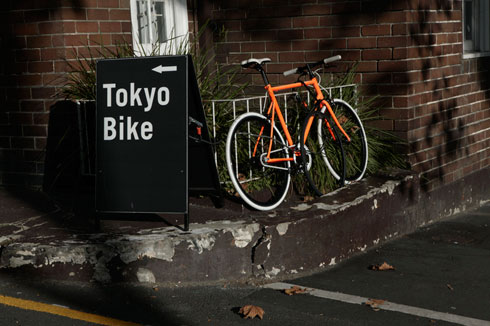
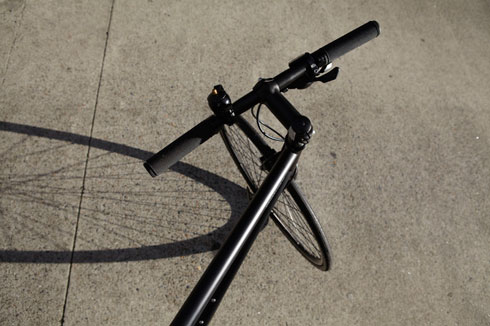
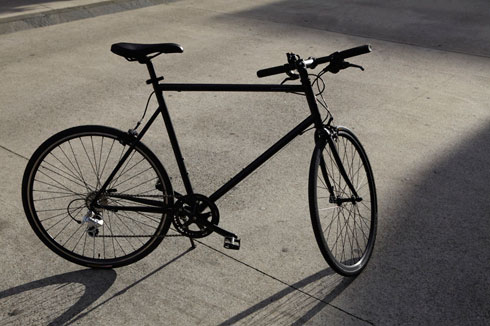
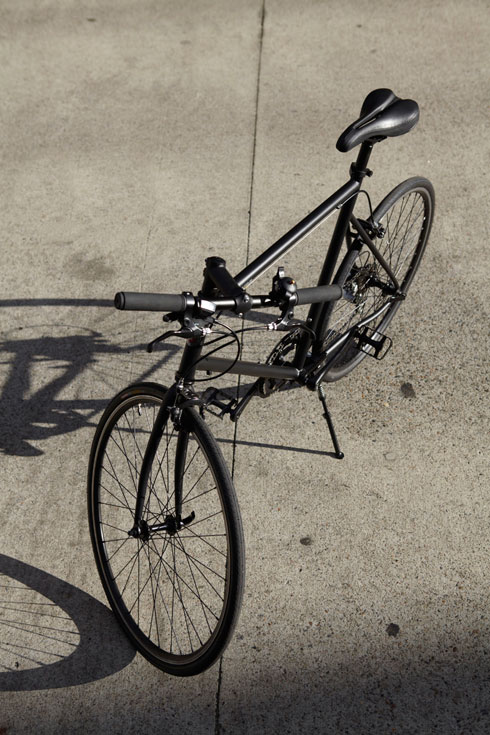
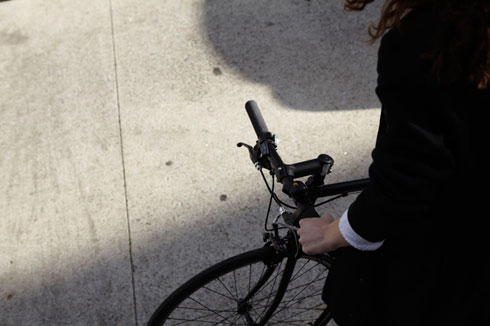
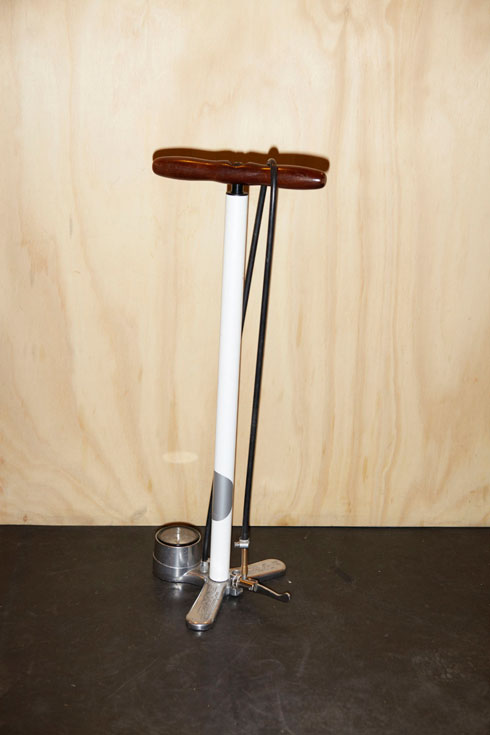
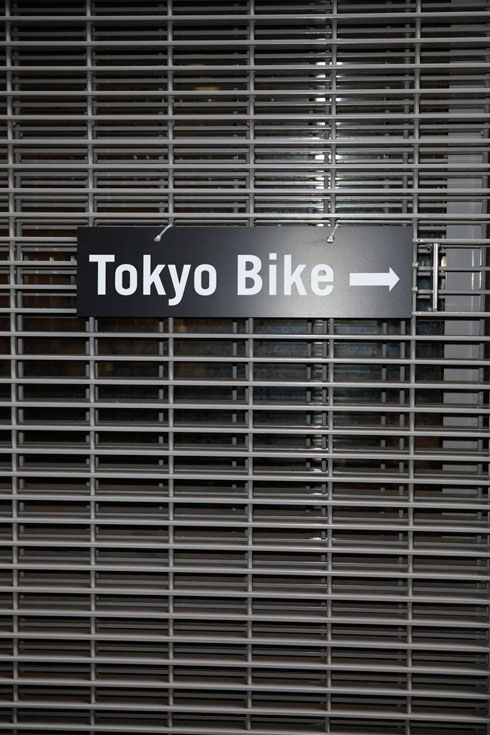
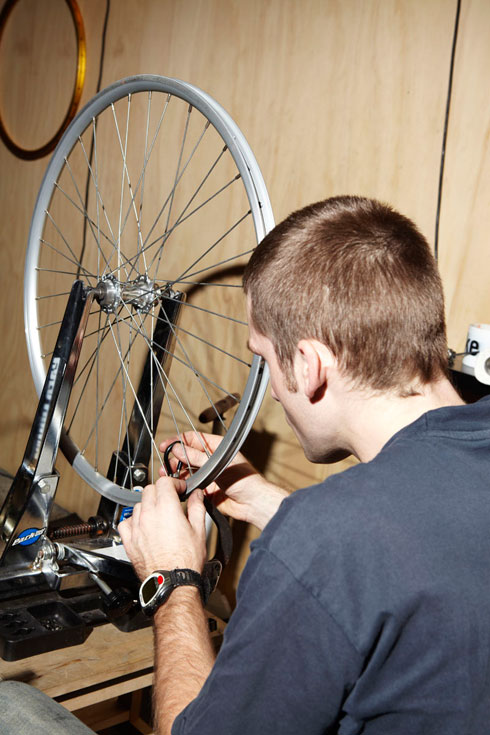
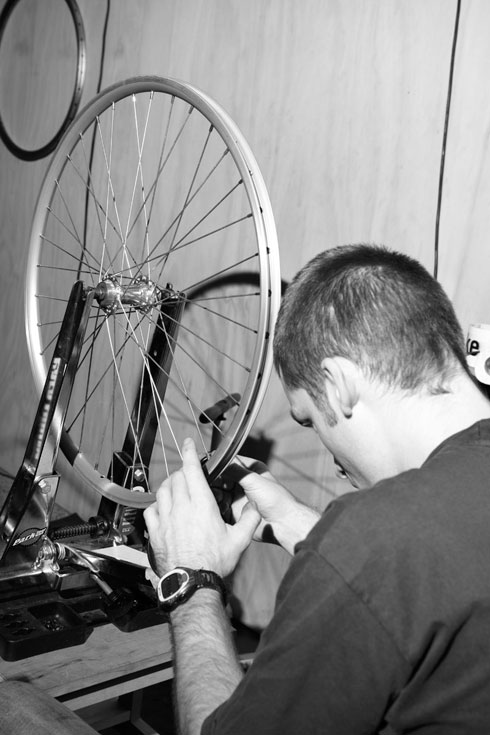
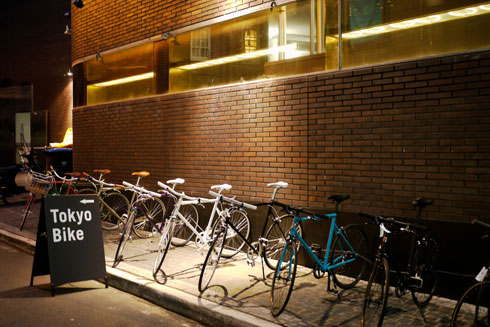
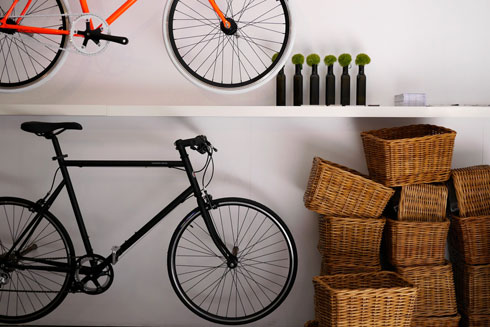
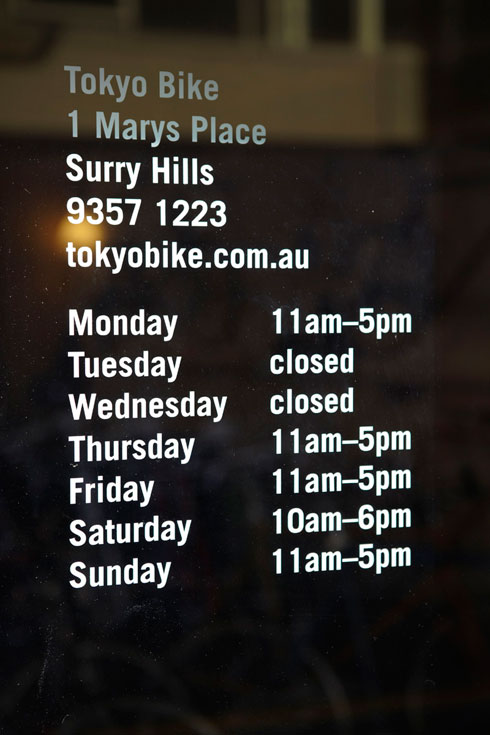 Text: Emma Capps Images: James Nelson & Tokyo Bike
Text: Emma Capps Images: James Nelson & Tokyo Bike
On the morning of a recent, glaringly beautiful Autumn day, I had the pleasure of speaking with Yuki Sugahara who, along with her husband, runs the year-old Tokyo Bike shop in Surry Hills, Sydney – a place so beguiling and nuanced that I’m still reflecting on what it is that makes this bike shop so singular.
The first permanent Tokyo Bike outside of Japan is tucked away on Marys Place, beside the bricked shoulder of the Beresford. Walking down the narrow lane, one is met with a thread of varicoloured bikes – sand brown, jeffer red, saffron, blue gray – indicating Tokyo Bike’s entrance. Available in four different models, the bikes all share their lightness of frame, the clarity of their design, and a smaller-than-average wheel circumference, which, combined, make for graceful, easy-to-ride, comfortable bikes.
Once inside, the shop itself is light, uncluttered, and subtly adorned with elements one would not usually find in a bike shop. Vases of carefully arranged flowers sit on various surfaces, incense perfume the air, wood logs tumble over each other with assorted bike-bells perched atop. All items in the shop seem arranged with precision and integrity. Perhaps it’s difficult for a reader to visualise without a visit to Toyko Bike – but all irrelevancies seem to have been eradicated, leaving all but a delicate, considered atmosphere.
The shop is often brimming with staff – Yuki and her husband, both from Tokyo, spend a lot of time amongst the bikes, along with their eight-month old baby boy. Also from Japan is Koji, the chief mechanic, who is, it must be said, immaculate; arriving to work in pristine clothes, and leaving at the end of a day spent assembling bikes, miraculously, still pristine. Michal from Prague, also a mechanic, is an ex-triathlete currently immersed in his English language studies. Wing, the shop manager and a graphic designer, arrived from Hong Kong a handful of years ago. As a result of the multinational backgrounds of the employees, communication between staff and customers is often punctuated with pantomimic gestures and fits of laughter.
Yuki is a warm, assertive woman, and a brilliantly animated conversationalist. She tells stories using lively hand gestures, leaning emphatically in to make a point, cocking her head to the side to ask her listener’s opinion. When she laughs, she leans her head back and really laughs. Her baby sits on her lap throughout our interview, bobbing up and down, staring into his mirror image in the window behind us, chirping happily to his own reflection.
Emma Capps: Yuki, can you tell me about how you initially became involved with Tokyo Bike?
Yuki Sugahara: We had our very first meeting in a café, me and my husband with the Tokyo Bike team in Japan, and they were just really lovely people – very grounded. The team was just the HQ President Ichiro, we call him Kin Chan, and the chief mechanic, and also Azusa, who is sort of, almost like, she’s the person who decides on colours, things like that – not everything, but Ichiro really depends on Azusa’s views on the look of the bikes. So Azusa is important, she has a very important role in the company. She does all the administration, but she’s also with Tokyo Bike for her advice on the look of the bikes.
EC: So, Azusa’s role is sort of like what an art director might do?
YS: Well, Ichiro does the design – so he’s the art director. But he might think of some vague ideas about something like the colour of the bikes, and when he needs to narrow it down, he presents his ideas to Azusa and asks, “What do you think?” You know, he doesn’t really care about what guys think, but what girls think.
Interesting isn’t it?
He cares, he cares. Because for him, he could kind of guess what the guys might want, because he’s a guy. But he really pays attention to girl’s opinions.
EC: Does this explain the more feminine touches in the shop, like the flowers, the incense and decorations, all those subtleties?
YS: Yes, because Tokyo Bike is really, actually targeting girls. Of course, we’re targeting everyone, but in terms of how Tokyo Bike is different from other more typical bike companies, I think the big difference is that Ichiro is concerned, he’s very concerned with women.
I think – well, I haven’t talked to major bike companies, but I don’t know if they care about what girls think. Which explains all those little things about us – like the flowers in the shop. And on top of that, we have female staff, which is uncommon for bike shops; and this is because Ichiro really cares about women.
EC: And there are other important concerns that really explain Ichiro’s ethos for the brand.
YS: For Ichiro, Tokyo Bikes are a way to move around the city and just enjoy it. With this in mind, the bikes need to be light, so that they are easy to ride, they need to be comfortable, and they should be reasonably priced, so that they can reach many people.
Tokyo is very famous for its bike culture. In Japan, beautiful bikes get produced that sell for thousands and thousands of dollars. But Tokyo Bike thought, well, our bike has to be at this price point, so that it’s accessible for a lot of people. And from that price point, we think about the mechanisms in the bike, so that each part can be the perfect part for that price point.
So, we know who we are targeting, and within our price point, we choose perfect parts, the best parts, so we are very confident in our bikes. It’s a very honest product, in that sense; we’re not pretending to be something more. It’s there, and it’s enough to support you as you enjoy your life.
Ichiro himself is written up as a keen cycling enthusiast, but he’s not actually. He wanted to design a bike that would be perfect for getting him to his favourite places – restaurants, cafes, cinemas. He’s someone who enjoys eating, drinking, socialising, going to museums, going to the park, he’s that kind of guy.
EC: So the bike is for him a way to appreciate living in the city.
YS: Exactly. It’s like for him, Ichiro is not a (boggles her eyes, and mimes gripping a bike’s handles, leaning forward and riding with mad enthusiasm) ‘huugggh’ bike guy, so that explains why Tokyo bike is not so…huugggh. It’s really relaxed. The whole thing.
EC: That makes so much sense. The design of the shop and all it’s contents seem so in line with that idea.
YS: Yes. Tokyo Bike exists to make life more colourful. And, we also introduce new colours every year – to make the bikes more lively.
EC: And how did it come about that Tokyo Bike came to Sydney?
YS: Well, the Tokyo Bike team in Tokyo initially met us [Yuki and her husband] by chance, and they told us that they were wanting to branch out into other countries outside Japan. They had been approached by many businesses in Europe, but weren’t sure how to proceed. And my husband and I were actually moving to Sydney anyway, and I thought Sydney could be nice for Tokyo Bike – so we all came, and saw the city. We didn’t see that many people riding bikes, but the weather, well, god people can ride their bikes all year-round here. Although there are hills, but they’re fine with gears.
So we felt, oh good, this works…or, it will work. It will probably take some time, because it’s education, people will have to learn about riding here…
EC: Why did you and your husband personally decide to move to Sydney?
YS: Sydney? We just liked it. We went on an around the world trip, just to see where we might want to live. We love Tokyo, we loved being there, but we felt it was becoming a little bit too easy for us. We had good jobs there, connections there… our favourite places… we were maybe a bit too comfortable.
EC: And you were working as an interior designer in Tokyo?
YS: Yes, I was doing a residential project with architects, but I also was working as an interpreter for visiting European designers doing interviews in Japan. And my husband was, and still is, running a startup company that caters for people in creative fields. A lot of creative people make beautiful things, but don’t know how to market them, or make money from them; so he connects them with the right people and makes it happen.
EC: Tell me about how you came to the design of the shop.
YS: All together, the team in Japan wanted to make it really simple – we almost didn’t want to do anything, we had this white space, and we almost could have done nothing to it. But we needed storage [the back wall of the shop is lined with perforated wooden floor-to-ceiling cupboards], and we also wanted to show the mechanics working in the shop. Like an open kitchen. A lot of the time, in other bike shops, mechanics are hidden, and you never see what’s going on, but I wanted to show them – because, of course, we assemble and service Tokyo Bikes here in the shop.
Importantly, we also wanted the bikes to be displayed outside, because we want people to take test-rides, and also, so much of the beauty of Tokyo Bike is the colours, so we wanted to show as many as we could. The headquarters in Yanaka have a similar space outside their shop as well.
EC: The shop always feels so lively. It has such a great atmosphere – I think a big reason for that is that you have staff from so many different countries. Was that accidental?
YS: Well, when we first opened the shop, it was me, I was very pregnant, and there was Koji and my husband. So it was Japanese staff only – people came in and said that it felt just like they were in Tokyo. I had this huge belly, Koji at the time didn’t speak a word of English – it was funny! It was very, uh, different (laughs).
The internationality of the staff was totally accidental, although we did want to have staff who weren’t Japanese, so it’s all turned out well.
EC: Yes, and although English is spoken, there are kind of three languages operating within the shop…
YS: Yes! Sure, it’s international – it’s fun!
EC: And your husband’s doing a big European trip at the moment, right?
YS: Yes, he’s now in Tokyo, then he’s flying to the UK, as there’s going to be a second pop-up in London, which will lead to a permanent shop. And we now have dealers in Copenhagen, Berlin, and Eindhoven in Holland. In Holland they are set up and selling already, in this great lifestyle shop called Piet Hein Eek. In Berlin, we are exhibiting at Design Week. And in Copenhagen, we will be selling Tokyo Bikes within another bike shop.
[Yuki’s baby lets out a particularly noisy, happy squeal, and Yuki and I laugh]
EC: Your son is such a big part of the shop, I think, by chance, he ends up playing an significant role in people’s perceptions of the shop.
YS: I think so! When we agreed to help start up Tokyo Bike in Sydney, I wasn’t pregnant, but after we found out, the staff at the headquarters thought it was great. They were very supportive – if I could still manage the shop, they thought it would be awesome.
EC: Well, your family have such a presence in the shop, which is so different to how retail environments normally operate. You never really get a sense of people’s real lives. There’s generally a ‘retail’ façade, and you don’t get any idea of the anyone’s real personalities… where as here, you and your family are living your life, in the shop. You’ve got your baby in the shop, your husband co-runs the shop…
YS: Well, yes. We don’t want to be intimidating at all. If customers can feel relaxed because of us being like that, and hop on one of our bikes, take a test ride and just enjoy themselves, then it’s working, it’s good. We didn’t plan it this way, but if it helps, and if it makes people feel happy and comfortable, then that’s great.
Tokyo Bike
Next story: Watch Your Coat-tails – James Nelson



